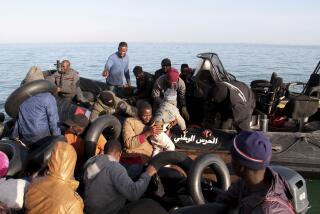NORTH AFRICA : Tunisia Is Slow to Follow Algeria on Democracy Path : While one rushes headlong into pluralism, legalizing 30 opposition parties, the other moves cautiously.
- Share via
TUNIS, Tunisia — When soldiers and armored personnel carriers moved into the streets of neighboring Algiers this month to quell Islamic fundamentalist violence, Tunisians, with a growing Islamic movement of their own, were alarmed, curious, fearful--and finally, more than a little smug.
We told you so , was the unspoken message of the ruling party here and the small network of opposition parties, which in recent months have allied themselves with the regime against the increasing stridency of the fundamentalists.
Tunisia and Algeria both have flirted with democracy after years of single-party rule. But while Algeria rushed headlong into pluralism, legalizing more than 30 opposition parties in a single year--including an Islamic party--Tunisia was more cautious, stepping a toe at a time toward democratic reform.
Its Islamic movement was kept under constraints, allowed its own student union, even permitted to publish a newspaper. But official party status? Much of Tunis--its streets lined with crowded sidewalk cafes, newsstands filled with colorful French magazines and women in chic business ensembles--shuddered at the thought.
“For the last couple of weeks, with what happened in Algiers, they’ve been going around with big grins on their faces, like the cat that swallowed the canary,” said one Western diplomat based in the capital.
Many senior leaders of Tunisia’s Islamic Ennahda movement were jailed last month when the government claimed to have uncovered a plot to overthrow President Zine Abidine ben Ali and install an Islamic state. A third of the 300 arrested--many of whom have since been subjected to torture and held incommunicado, according to Amnesty International--were army members.
But Tunisian officials know that arrests will not make the Islamic movement go away. They are looking to a new, more moderate strain of Islam developing in the wake of the recent unrest as a possible means of incorporating Islam into Tunisia’s political mainstream.
Some Ennahda members were horrified when student demonstrations escalated into violence, culminating in a February incident in which two security guards at an office of Ben Ali’s ruling Constitutional Democratic Rally were doused with gasoline and set afire. One man died.
Abdelfatah Mourou, an Ennahda leader who had grown estranged from the Islamic group’s strident, radical tone, finally broke away and announced he is forming an Islamic movement opposed to the use of violence.
Government leaders are watching it closely to see if it may offer a path to political reconciliation with fundamentalists.
“The law on political parties is against using religious ideology to build a party. But if they respect the law, if they prove their political values are democratic values, pluralistic values, I think everything is possible,” said Iadh Ouederni, Cabinet director of the ruling party.
Mourou himself is a fundamentalist with a ‘90s message: that modern Arabs are not seeking a rigid, theocratic state but a return to Islamic values in schools and a chance to inject them into everyday political discourse.
What this does not mean, he says, is preventing men and women from working together publicly or abolishing Tunisia’s landmark feminist laws outlawing polygamy and permitting women to initiate divorces.
“When we speak of Islam,” he said, “we do not speak of the application of an Islam of the past” when “the woman was under the veil, the woman could not go out of her house, the woman couldn’t work. That is not Islam. These are traditions, whose function is past. . . .”
Many Tunisians seem ready to give Mourou the benefit of the doubt, if only to open the door on a friendlier Islamic tiger.
Not even Tunisia’s feminists, traditionally the most vehement fundamentalist opponents, are ruling anything out.
“Democracy is something which must be cultivated,” said Neziha Mazhoud, president of the Union of Tunisian Women. “It isn’t simply handed down. It is grown slowly, and carefully.”
TUNISIA AT A GLANCE
Population: 7.8 million
Area: 63,170 square miles (twice the size of South Carolina)
Monetary unit: dinar
Language: Arabic (official), Berber, French
Religions: Islam, Christianity, Judaism
Economic activities: Tourism, oil and petroleum products, agriculture (wheat, olives, citrus fruits, grapes, dates), manufacturing (textiles, leather, fertilizers) and mining
More to Read
Sign up for Essential California
The most important California stories and recommendations in your inbox every morning.
You may occasionally receive promotional content from the Los Angeles Times.










